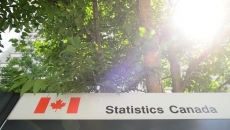VICTORIA - British Columbia has earmarked $2.1 billion to fund disaster recovery efforts and future response to the threats posed by wildfires, floods and heat waves in a budget that forecasts a $5.5 billion deficit.
Finance Minister Selina Robinson said Tuesday a three-year climate fund will support ongoing disaster cleanup and rebuilding in southern B.C. communities hit by last November’s floods and mudslides.
The budget does not include a total estimate of the recovery costs, prompting the government to add a $1.1 billion contingency fund in its financial accounting for the 2022-23 fiscal year to cover future costs.
“While we have all experienced the realities of climate change this year, I can’t help but think of Indigenous people in the Nicola Valley, farmers in Abbotsford and the residents of Merritt, Princeton and Abbotsford,” said Robinson, referring to communities damaged by flooding last November.
“There is a long road ahead and rebuilding what we have lost is only part of the job,” she said. “We must act now to protect people and communities against future climate disasters.”
Robinson said the $2.1 billion climate response and adaptation program includes wildfire prevention support for communities and expands the province’s B.C. Wildfire Service into a full-time operation.
Heavy rains last fall also triggered landslides that closed major rail and highway transportation routes to B.C.’s Interior.
Aaron Sutherland of the Insurance Bureau of Canada said the climate funding is an important step to addressing the risks associated with climate change.
“It’s important as a society, we come together and have a frank conversation around how we’re going to better protect our communities moving forward,” he said. “This is the first budget I can think of that really starts to put serious investments into building resiliency into those risks.”
Robinson said the climate fund includes $1.5 billion to support disaster recovery and response activities underway in hard-hit communities, covering contracts for debris removal and clean-up costs.
The minister said despite the challenges of the COVID-19 pandemic, climate change and the discovery of unmarked graves at residential schools, the province strives to be economically, socially and environmentally strong.
“We have all learned a great deal over the last two years,” Robinson said. “Through each challenge, we have seen time and time again that we are stronger together. There is a long road ahead as we all rebuild and repair the damage left by these difficult times.”
The budget forecasts economic growth of four per cent economic growth in 2022, down from the five per cent estimate for 2021.
The deficit is forecast to drop to $3.2 billion in 2024-25. The provincial debt is forecast to increase to $105 billion in this fiscal year from $91.5 billion.
Families can expect lower child-care costs, she said, adding that the NDP government is "continuing to make progress" towards its promise of $10-a-day child care, with fees to stand at $20 a day by the end of the year.
The budget also includes a $633 million to address homelessness primarily through providing more secure housing and support options for vulnerable people.
Robinson said forest industry workers and communities affected by the government’s strategy to protect old-growth forests will be eligible for a $185 million program that provides retirement-bridge funds and job training.
The Opposition B.C. Liberal party criticized the budget for not doing enough to cut the cost of living.
"From the absence of measures to meaningfully address the rising cost of housing, gas and groceries, to the lack of progress on affordable child care, and the continued underfunding of needed mental health and addictions supports, Budget 2022 completely misses the mark," said Peter Milobar, the party's finance critic.
"People are looking to the NDP government to solve these problems because they repeatedly promised they would."
Here are highlights from the B.C. budget tabled Tuesday:
— The government is earmarking $2.1 billion to fund disaster recovery efforts and future response to the threats from wildfires, floods and heat waves.
— The deficit is forecast to be $5.5 billion for the 2022-23 fiscal year.
— Average child-care fees will drop to about $20 per day after the NDP promised $10-a-day child care.
— $22 million will be spent to support survivors and restore funding for 50 sexual assault centres.
— A new Declaration Act Secretariat will ensure legislation is consistent with United Nations Declaration on the Rights of Indigenous Peoples and that it is developed in consultation with Indigenous Peoples.
— $27.4 billion will be spent on infrastructure over three years, including on the SkyTrain from Surrey to Langley.
— The number of urgent and primary care centres will be doubled by 2025 as part of $3.2 billion earmarked for the health and mental health-care systems.
— The provincial sales tax will be removed on all electric heat pumps.
— A new clean buildings tax rebate will provide incentives to undertake energy refits of larger rental and commercial buildings.






